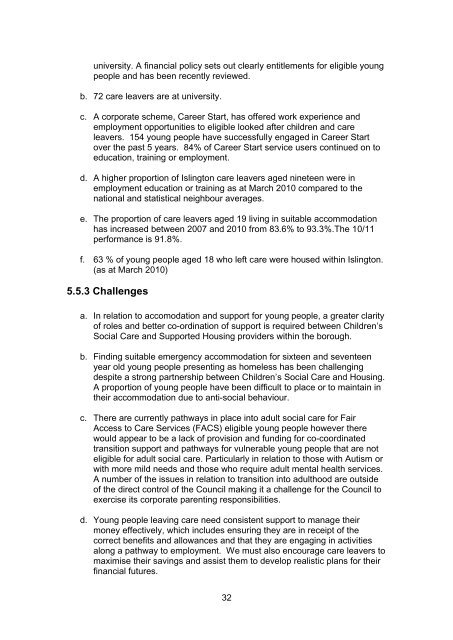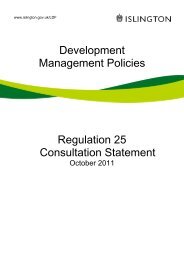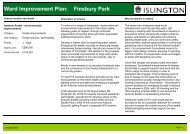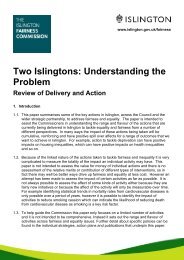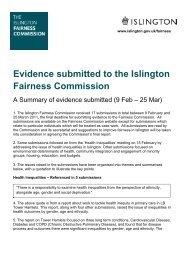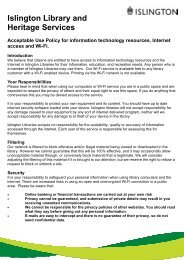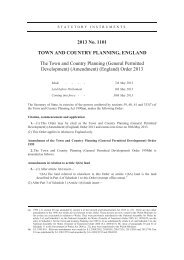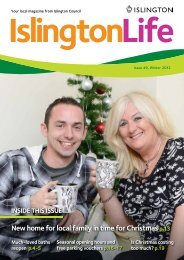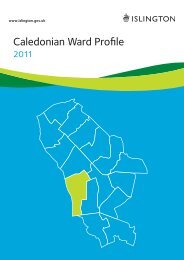The Islington Plan for Looked After Children and ... - Islington Council
The Islington Plan for Looked After Children and ... - Islington Council
The Islington Plan for Looked After Children and ... - Islington Council
Create successful ePaper yourself
Turn your PDF publications into a flip-book with our unique Google optimized e-Paper software.
university. A financial policy sets out clearly entitlements <strong>for</strong> eligible young<br />
people <strong>and</strong> has been recently reviewed.<br />
b. 72 care leavers are at university.<br />
c. A corporate scheme, Career Start, has offered work experience <strong>and</strong><br />
employment opportunities to eligible looked after children <strong>and</strong> care<br />
leavers. 154 young people have successfully engaged in Career Start<br />
over the past 5 years. 84% of Career Start service users continued on to<br />
education, training or employment.<br />
d. A higher proportion of <strong>Islington</strong> care leavers aged nineteen were in<br />
employment education or training as at March 2010 compared to the<br />
national <strong>and</strong> statistical neighbour averages.<br />
e. <strong>The</strong> proportion of care leavers aged 19 living in suitable accommodation<br />
has increased between 2007 <strong>and</strong> 2010 from 83.6% to 93.3%.<strong>The</strong> 10/11<br />
per<strong>for</strong>mance is 91.8%.<br />
f. 63 % of young people aged 18 who left care were housed within <strong>Islington</strong>.<br />
(as at March 2010)<br />
5.5.3 Challenges<br />
a. In relation to accomodation <strong>and</strong> support <strong>for</strong> young people, a greater clarity<br />
of roles <strong>and</strong> better co-ordination of support is required between <strong>Children</strong>’s<br />
Social Care <strong>and</strong> Supported Housing providers within the borough.<br />
b. Finding suitable emergency accommodation <strong>for</strong> sixteen <strong>and</strong> seventeen<br />
year old young people presenting as homeless has been challenging<br />
despite a strong partnership between <strong>Children</strong>’s Social Care <strong>and</strong> Housing.<br />
A proportion of young people have been difficult to place or to maintain in<br />
their accommodation due to anti-social behaviour.<br />
c. <strong>The</strong>re are currently pathways in place into adult social care <strong>for</strong> Fair<br />
Access to Care Services (FACS) eligible young people however there<br />
would appear to be a lack of provision <strong>and</strong> funding <strong>for</strong> co-coordinated<br />
transition support <strong>and</strong> pathways <strong>for</strong> vulnerable young people that are not<br />
eligible <strong>for</strong> adult social care. Particularly in relation to those with Autism or<br />
with more mild needs <strong>and</strong> those who require adult mental health services.<br />
A number of the issues in relation to transition into adulthood are outside<br />
of the direct control of the <strong>Council</strong> making it a challenge <strong>for</strong> the <strong>Council</strong> to<br />
exercise its corporate parenting responsibilities.<br />
d. Young people leaving care need consistent support to manage their<br />
money effectively, which includes ensuring they are in receipt of the<br />
correct benefits <strong>and</strong> allowances <strong>and</strong> that they are engaging in activities<br />
along a pathway to employment. We must also encourage care leavers to<br />
maximise their savings <strong>and</strong> assist them to develop realistic plans <strong>for</strong> their<br />
financial futures.<br />
32


